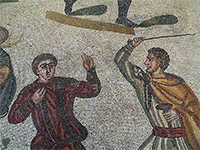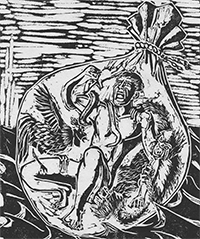
Roman Life
The Jews of Jesus' time lived under the rule of the Romans. Therefore, an understanding of Roman life and culture is very instructive when one endeavors to peer into New Testament times. Judea and Rome were both patriarchal societies, and dealt with citizen misbehavior in ways that many would consider harsh by today's standards. However, Roman legal standards and ways of dealing with life's injustices were distinct, and knowledge of these gives important perspective to our view of the ancient world.
Discipline and Punishment

The ancient Romans had no such punishment as "life in prison." They did not consider housing, feeding, and clothing a person who had broken the law. The capital city of Rome had over a million people in 100 AD, and only one, small prison. This was reserved for important prisoners, such as leaders or kings that were defeated by the Roman army during war. The building was dark, damp, smelly, full of rats. Convicts might be tortured regularly and, after the emperor tired of displaying them in public during festivals, they were executed.

The Roman Empire, with a population of over 35 million people, had many civil laws, e.g. regarding property rights, sales of merchandise, divorce, and policies regarding standard weights and measures. However, they had very few criminal laws, except those regarding patricide and treason. There was no police force, as people were expected to police themselves. Soldiers were stationed outside the city to keep order if there were riots or political unrest. There was no investigation of crime by authorities, so if a man was murdered, it was the responsibility of the eldest male in his immediate or extended family to extract vengeance. This might be in the form of blood money, but if money was not desired, or unavailable, the closest male of the murdered victim would hunt down and kill the perpetrator. In many cases, the criminal would flee the city before this could be carried out.
Traveling Roman roads without a large escort was risky as they were extremely crowded and dangerous. If one was wealthy, he would not walk the streets alone, even during the daylight hours. As 40 percent of the population was slave, many Romans would own many and would have their slaves surround them when traveling and clear the way for safe passage. Even the poor traveled with relatives, and no respectable woman traveled through the city by herself.
In the Roman household, the father or eldest male had complete power over the rest of his family. He could order the death of his wife and children for any reason, with impunity, and slaves were particularly vulnerable. Most of the slaves were captured in war and, in all but a few cases, would be slaves the rest of their lives, (as would be any children they might conceive). Slaves were forbidden to marry, were not Roman citizens, and had no rights under Roman law. The best hope of a slave would be to work in the household of a rich Roman who was decent in his treatment. Female slaves could be sexually assaulted at will and often were.

Punishments for crimes were generally carried out rapidly. For minor offenses, punishment include a severe beating, being flogged or branded on the forehead. More severe crimes were punished by putting out the eyes, ripping out the tongue, or cutting off ears. The death penalty included being buried alive, impaling and, of course, crucifixion. The Romans did not hesitate to torture before putting someone to death. One such punishment was sewing a bound prisoner in a heavy sack with a snake, a rooster, a monkey and a dog, then throwing the sack into the river. This punishment was usually reserved for patricide, or a son who killed his father. (Getting the Sack)
Not surprisingly, almost all Roman homes had bars around the windows and literally barred their doors at night. The streets were unlit and no one ventured out after sundown.
